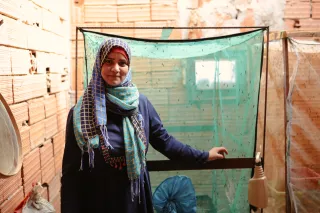
Fly breeding to support sustainable agriculture
With the cost increase and shortage of raw materials caused by the global economic context in recent years, some entrepreneurs have taken up the challenge of finding alternatives that will drastically change the agricultural sector of tomorrow. This is the story of Faoizia who was supported by WIDU in launching her innovative business in composting in the Tunisian region of Medenine.
"In my region, we have a lot of issues on waste management, and I always wondered how we could solve them. After much research, I discovered the magical power of Hermetia illucens flies, known as "black soldiers flies", in the processing of organic waste.”
With a negative carbon footprint, these little insects have more than one virtue in their paws. As larvas, and stored in a waste plant, they start the meticulous task of transforming waste into high-quality proteins. On the one hand, the organic material produced is used as a protein additive in animal feed, providing a cheap, clean and sustainable food source. On the other hand, it is used to clean up soils through a 100% organic compost and soil corrector.
"It’s a product that is almost non-existent on the Tunisian market. Apart from its high protein and 100% natural value, which offers all the food supplements that soils and livestock need, it’s also a more affordable product for Tunisian farmers who are suffering a lot from the increase of prices of livestock feed in Tunisia.”
Faoizia conducted her first breeding trials in her garden. As a self-learner, she learnt everything by herself: how the black soldier fly lives, its behavior, the temperatures that are ideal for it, what it likes or dislikes... Finally in September 2022, Faoizia officially launched her fly breeding company.
Discovering the WIDU project on social networks, Faoiza, supported by her brother living in France, was able to benefit from professional guidance provided by the project through a technical partnership with Redstart. The entrepreneur also received a grant of 1,000 euros to purchase the equipment needed to develop her production.
"Thanks to WIDU, I was able to consolidate the first foundations of my project in a more professional way. The grant I received allowed me to buy the machines I needed to start my production, to gain my first profits, and to create two additional part-time jobs.”
Currently, Faoizia produces about 50kg of compost per month, which she sells to vets and farmers in her area. The development of her business will soon allow her to increase her production capacity, but also to extend her activities to the production of flour and oil used in the cosmetic sector, as well as to poultry breeding.
